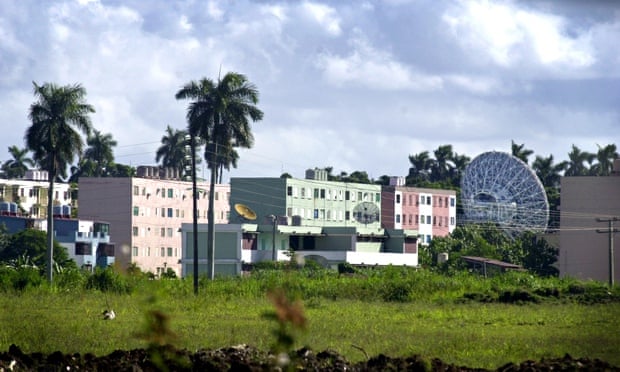
The Russian radar station in Lourdes, south of Havana, was the Soviet Union's largest foreign base, and will now be reopened. Photograph: Cristobal Herrera/AP
Russia has quietly reached an agreement with Cuba to reopen a Soviet-era spy base on America's doorstep, amid souring relations between Moscow and Washington.
The deal to reopen the signals intelligence facility in Lourdes, south of Havana, was agreed in principle during president Vladimir Putin's visit to the island as part of a Latin American tour last week, according to the newspaper Kommersant.
Opened in 1967, the Lourdes facility was the Soviet Union's largest foreign base, a mere 155 miles from the US coast. It employed up to 3,000 military and intelligence personnel to intercept a wide array of American telephone and radio communications, but Putin announced its closure in 2001 because it was too expensive – Russia had been paying $200m (£117m) a year in rent – and in response to US demands.
After Putin visited Cuba on Friday, the Kremlin press service said the president had forgiven 90% of Cuba's unpaid Soviet-era debts, which totalled $32bn (£18.6bn) – a concession that now appears to be tied to the agreement to reopen the base.
"Lourdes gave the Soviet Union eyes in the whole of the western hemisphere … For Russia, which is fighting for its lawful rights and place in the international community, it would be no less valuable than for the USSR," Vyacheslav Trubnikov, former head of Russia's foreign intelligence service told Kommersant.
The move appears to be part of Moscow's campaign to reassert itself as a geopolitical rival to the United States and comes as the west is set to expand sanctions against Russia over its role in the Ukraine conflict. European Union leaders are expected to implement further asset freezes and stop lending to Russia at a summit on Wednesday, while the United States is reportedly considering its own unilateral sanctions against the Russian financial and defence industries.
During Putin's Latin American tour, he also signed agreements to establish positioning stations in Argentina, Brazil and Cuba for Glonass, Russia's answer to the United States' global positioning system (GPS). He also made a surprise stop to discuss placing a Glonass station in Nicaragua, where president Daniel Ortegacalled Putin's first visit to the country a "ray of light"."The goal of Putin's visit to Cuba, Nicaragua and Argentina was to strengthen geopolitical connections with Latin America in response to the United States' attempts to isolate Russia," Alexei Pushkov, the chairman of the foreign affairs committee in Russia's parliament, tweeted after the trip.
Reopening the Lourdes base marks another low in US-Russian relations, although some experts argue the significance of the move is largely symbolic. Moscow-based defence analyst Pavel Felgenhauer called the reported re-establishment of the Lourdes base a "PR move" to show Washington the "middle finger" and said it was prompted in part by the expansion of western influence in Ukraine. Russian officials have worried that Ukraine, which recently signed an association agreement with the EU, will become the latest former Soviet republic to join Nato.
"There's not much radio chat left of any importance, it's all going to coded channels, so I think the intel-gathering value would be much less than 20 years ago," he said. However, the base could be useful for stealing commercial secrets, Felgenhauer admitted, "because when individuals chatter they're not always so attentive of secure lines."
But Ruslan Pukhov, the director of the Centre for the Analysis of Strategies and Technologies in Moscow, said the base does have military value and that negotiations with Cuba were likely mostly completed before the Ukraine crisis even started in November. The reopening follows Russia's attempts to break its "strategic solitude" by improving military cooperation with other countries and said it could share information from the base with US rivals like China, he said.
"Any country that is supporting us, whether it's Cuba, Nicaragua, or Venezuala, is welcome, and we are not as poor as in the 1990s, we are ready to pay for this," Pukhov said. "Since we have very big problems with spy satellites, which are full of Western components, and our spy ships are not in good shape and can't get close to US shores, this base is extremely important for us."
Similarly, the placement of Glonass stations in new countries is important for the commercial future of the project, which has become a "kind of fetish for Russian political establishment," Pukhov said. Notably, the United States has refused to host a Glonass station, although Russia has continued to offer. On Wednesday, Russian space systems head Gennady Raikunov suggested placing a Glonass station on the Alaskan coast in comments at the Farnborough Airshow in Hampshire, Russian news agency Interfax reported.
Link : http://www.theguardian.com/world/2014/jul/16/russia-reopening-spy-base-cuba-us-relations-sour

No comments:
Post a Comment